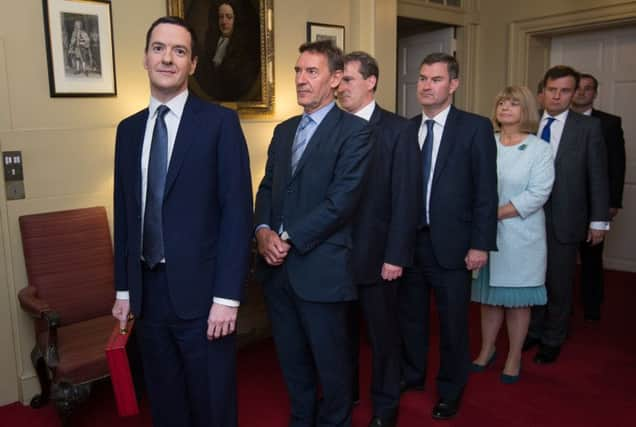UK ‘open for business’ but firms fear losing out


The Chancellor declared Britain “open for business” as he said firms already paid the lowest rate of corporation tax in the G20 group of countries after a series of reductions brought it down to 20 per cent, from 28 per cent in 2010.
In 2017, corporation tax will be reduced to 19 per cent, before falling to 18 per cent in 2020.
Advertisement
Hide AdAdvertisement
Hide AdMr Osborne said: “We’re giving businesses the lower taxes they can count on, to grow with confidence, invest with confidence and create jobs with confidence. A new 18 per cent rate of corporation tax – sending out loud and clear the message around the world: Britain is open for business.”
Toby Ryland, corporate tax partner at chartered accountant HW Fisher & Company, said: “Britain may lack the sunny beaches of most offshore tax havens, but the continued slashing of corporation tax is an unambiguous call to foreign companies to bring their business here.”
However, CBI director-general John Cridland described yesterday’s Budget as a “double-edged” statement for business.
He said: “The further reduction in corporation tax is a welcome surprise but tax reductions for employers don’t appear to match the businesses most affected by a rise to £7.20 in the national minimum wage next April – a 7 per cent increase.
“The CBI supports a higher-skilled, higher-wage economy, but legislating for a living wage does not reflect businesses’ ability to pay. This is taking a big gamble that the labour market can absorb year-on-year increases of an average of 6 per cent.”
That view was echoed by Andy Willox, Scottish policy convener at the Federation of Small Businesses, who said many employers will be poring over their books to understand what the changes to taxation and minimum wages will mean.
“The understandable governmental drive to boost wages must be accompanied by extra help to make the numbers work in the sectors where we know pay and margins are a problem,” Mr Willox said.
“Next year’s minimum wage increase will be difficult for employers bound into long-term contracts with big business or the public sector. We know low pay isn’t a big business or small business problem but an issue for certain sectors like retail and care. We’ll need to see governments in Edinburgh and London support firms – ensuring rogue operators and foreign competitors don’t get the better of them.”
Advertisement
Hide AdAdvertisement
Hide AdCharlotte Barbour, director of taxation at the Institute of Chartered Accountants of Scotland, said the cut in corporation tax was being put forward as a “compensatory measure” for changing the national minimum wage to a living wage, but added: “It is not necessarily the case that the profits a company generates will equate to the number of people employed and on low wages.”
Small businesses will see National Insurance contributions cut next year through a 50 per cent increase in the government’s new employment allowance to £3,000.
Mr Osborne also said that companies with annual profits of more than £20 million will see their corporation tax payment dates brought forward, “so tax is paid closer to the point at which profits are earned”.
He added: “This is fair, it’s more in line with what we’re doing in personal tax and is what almost all other G7 nations do.”
COMMENT
Liz Cameron: The transition to the new wage level must be managed carefully
It seems that the Chancellor has been waiting a long time to exercise full control over a Budget without the necessary constraints of coalition government, and the result is one of the most densely packed Budgets we have seen in recent years.
As businesses, there are a range of measures that have caught our eye and perhaps none more so than the creation of a new national living wage.
While this new obligation on employers only applies to employees aged 25 and over and is at a lower rate than the living wage (currently £7.85 per hour outside of London), it nonetheless represents an increase of more than 10 per cent on the current national minimum wage of £6.50 (the new wage will be £7.20).
Advertisement
Hide AdAdvertisement
Hide AdThe majority of businesses already pay this rate or more to all of their employees so, for them, the transitions should be fairly straightforward. However, where we do have some concerns is in the treatment of those businesses for which salary increases of this nature may not fit around their current commercial realities – for example some smaller businesses in the retail, hospitality and care sectors.
Many of these businesses will aspire to pay their staff at these levels and the only thing holding them back is the commercial nature of the businesses they operate in. If they are to increase wages, then ultimately their customers’ willingness to pay more will be the determining factor, and some of these customers could be in the public sector.
That is why the transition must be managed carefully for these companies, whose business models will need to change within the next nine months to comply with the new laws.
The UK government is clearly attempting to shift a key balance in our economy. The state will contribute less in the shape of in-work benefits, while businesses are expected to shoulder more of the burden in terms of providing financial reward to employees.
This is a natural and logical transition, but time will tell whether the government has got its timing right.
• Liz Cameron is chief executive of Scottish Chambers of Commerce